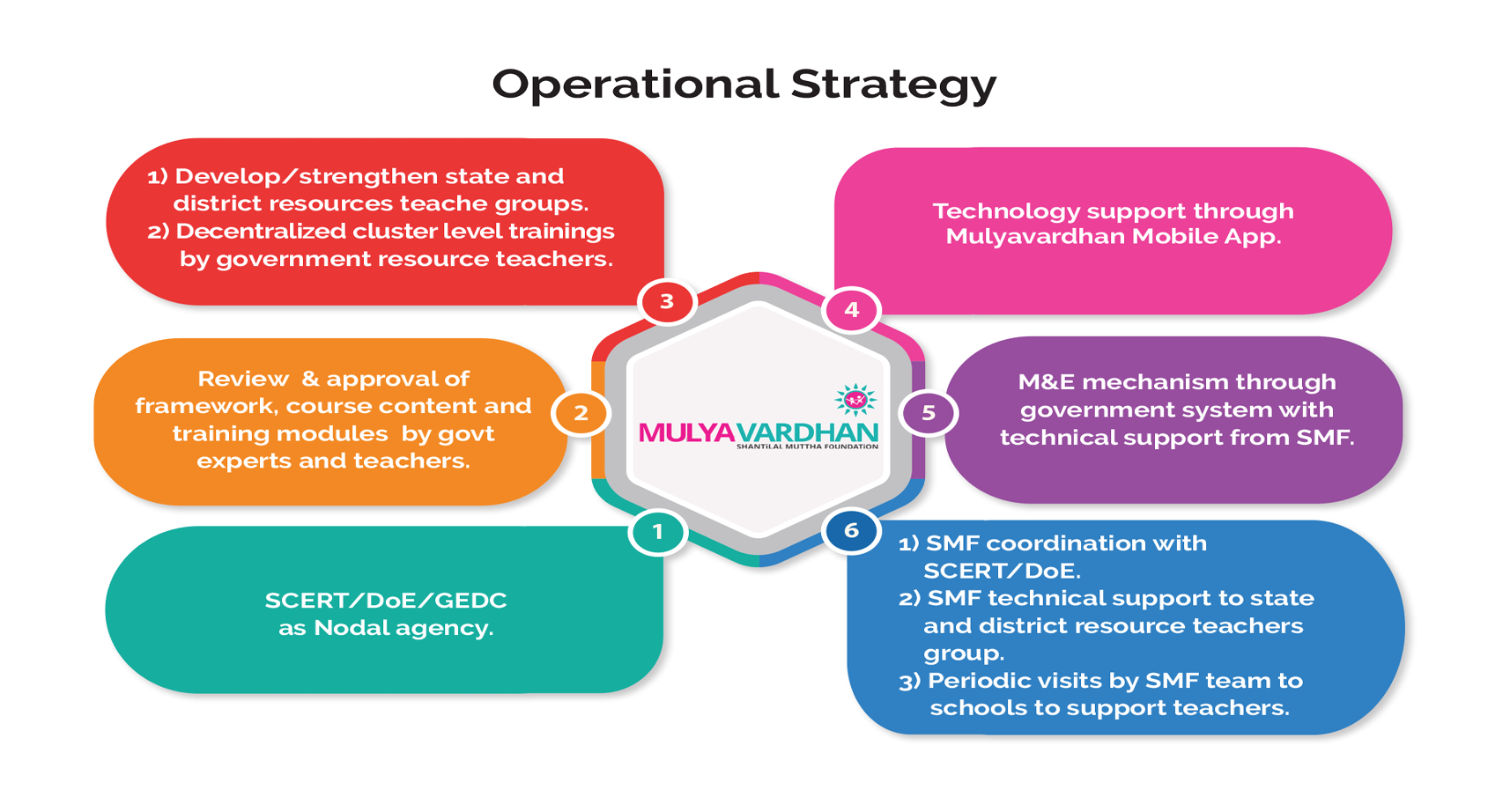Mulyavardhan strives to empower all stakeholders, children, teachers, headmasters, school mamangement committee members and parents, in the school systems through building the capacities of teachers/teacher educators and school heads. They go forth to become resource persons to train and mentor others within the school system, ensuring the sustainability of Mulyavardhan concepts and practices. The capacity building workshops commence the operationalization of the programme by:
Empowerment of School System
• Empowering teachers to conduct Mulyavardhan grade-wise classroom activities
• Empowering school heads and teachers to conduct school-wide activities
• Empowering teachers to integrate Mulyavardhan pedagogy and content with all subjects

Mulyavardhan uses a whole-school approach, whereby the entire school ethos and all school processes are guided by core democratic values. What this means for students is that the school environment is safe, inclusive and supportive and actively challenges any form of violence or discrimination. This also means that any rules or policies formed to create an environment like this are created in a participatory manner and communicated to all stakeholders. MV approaches this critical task with a multifaceted approach to help schools envision and plan this, the Programme has a Framework for Assessment of School Value Practices. 
Mulyavardhan's whole-school approach is given a specific direction through certain educational practices that are meant to improve student teacher relationships, promote a feeling of oneness and provide frequent opportunities to achieve learning outcomes. These have been designed to be contextual, seamlessly meld into the curriculum and fit into the regular time table of the school.

activities will involve students directly in behavioural exercises or practice of social-cognitive skills, followed by facilitated discussion on what they have learned. These activities are contextual, learner centric and accessible for all students. These activities take less than 5% of total school hours in the year and involve cooperative-learning structures and open-ended questioning by using content like stories, incident-descriptions, skits, songs, poems, pictures and games.
School wide activities are done to nurture a sense of camaraderie and fraternity amongst the students. While they offer students a chance to demonstrate leadership and creativity, they also strengthen school and community relationships. Guidelines for planning and organizing school-level activities are provided in a guidebook for headmasters/school principals.
: MV in alignment with the RTE mandate of ‘learning through activities’ helps build an environment in school which promotes the use of pedagogy that encourages students to ‘construct’ their own learning. This promotes the development of autonomy and working in groups fosters empathy and cooperation. Teachers are encouraged and supported to use this pedagogy across academic teaching especially in languages and social studies.
To promote the effective use of all these practices MV provides capacity building support and guidebooks. Additional support to schedule these activities and contextualize them is also provided to the schools.
Operational Strategy
SMF works in collaboration with the state government and has support mechanisms at each step from teachers in schools to SCERT resource groups. The framework and curriculum are also regularly reviewed by govt. experts and teachers.

SMF is committed to supporting schools in implementing the Mulyavardhan program effectively by supporting them at every step of the way. The SMF model for school support has 4 key aspects to it.
SMF engages with the school in 3 phases
- Pre-intervention (about 3 months) – building buy-in of key decision makers
- During Intervention (12-36 months) – investing stakeholders, capacity building, baseline endline assessments etc.
- Post-Intervention – discussing challenges faced, ensuring sustainability

For effective implementation of Mulyavardhan, SMF offers capacity-building support to adult stakeholders like master trainers, school teachers, headmasters and education officials. The support is provided in two ways: • Through workshops of 1-5 days. • Through on-site and/or off-site support. • Through the Mulyavardhan App
A variety of support materials is given through the capacity-building workshops, such as: • Mulyavardhan brochure. • Guidebook for HMs with templates for reflection, planning and performance review • Grade-wise activity books for teachers for planning class activities • Guidebook for teachers • Grade-wise activity books for students
SMF is willing to offer implementation support to state governments and private school bodies that are interested in rolling out Mulyavardhan on a large scale. While the scope and terms of support will vary according to needs and resources, the range of possible support includes: • Programme planning. • Programme monitoring. • Programme evaluation.
Monitoring and Evaluation
A systematic structured Monitoring & Evaluation process and approach has been developed to understand the performance against the defined programme outcomes. This includes:
Monitoring activities
- Effectiveness of input processes:
training feedback forms, trainer evaluation - Monitoring of outputs: School visits
- Classroom and school-level observations by SMF trainers
and field staff - Classroom observations by Government officials
- Bi-annual joint school (and classroom) visits by SMF
Head Office and Senior Government officials
Evaluation activities
- Third party baseline and endline studies facilitated through
a Joint Coordination Committee of Government and SMF
members - Annual evaluation studies
- Narratives and anecdotal records
- Developing case studies of schools, teachers, students

Classroom performance Indicators
I1: Teachers demonstrate child-centred pedagogy
I2: Teachers provide stimulus for self-expression and self-management
I3: Students demonstrate self-awareness and self-management skills
I4: Teacher provides opportunities for demonstrating responsible behaviour and decision-making and also models
responsible behaviour
I5: Students exhibit responsible behaviour and make responsible decision
I6: Teachers demonstrate practices to promote social awareness and positive inter-personal relations
I7: Students demonstrate social awareness skills, non-discrimination, fairness, inclusion

